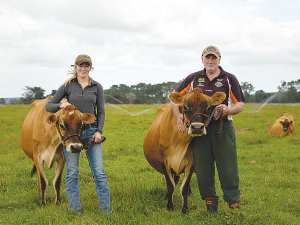Kiwi spearheads global Jersey strategy revamp
The global organisation for Jersey breeders has undergone a strategy refresh - spearheaded by new president and the first New Zealander to hold the post, Alison Gibb.
 Peter Horn's (right) great-grandfather started the Kuku Stud in 1914; five generations on, great-great-granddaughter Letitia Horn is continuing the family tradition.
Peter Horn's (right) great-grandfather started the Kuku Stud in 1914; five generations on, great-great-granddaughter Letitia Horn is continuing the family tradition.
The Horn family's Kuku and Allandale Jersey Studs are the oldest Jersey studs owned by one family in New Zealand, says Peter Horn recalling his great-grandfather started the Kuku Stud in 1914.
Five generations on, great-great-granddaughter Letitia Horn is continuing the family tradition - and passion for the Jersey breed.
"The origins of the herd are New Zealand bred sires from the country's top Jersey studs," Peter says.
"We began to dabble in North American genetics when the protein payout was introduced in the 1980s and used the bulls ValleyStream Duncan Dynamo and ValleyStream J.I.S Juno.
"Our cows were good at the time, but we wanted more milk."
The farm is 78 hectares of river-silt flats near Feilding, 45 hectares under irrigation. All stock are grazed on the farm - cows, young stock, bulls and the odd carryover.
Peter has made a lifelong study of bloodlines and knew that the right bulls would lift per cow production without costing type.
"Around 10 years ago World Wide Sires' breeding consultant, Jeremy Gloyn, put me onto a bull called Tbone.
"I bought every straw I could get of that bull - around 800 - and got around 150 daughters. Tbone was an exceptional bull and he turned the herd around for production. Valentino was also a good bull that I used.
"Tbone daughters are very high type commercial cows which have excelled for us both on-farm in the show ring. Last year we won the Premier Jersey Breeder Award at the Dairy Event. Tbone daughters are good size with beautfiul bone and are free milking cows. They have beautiful udders and are free milking cows. They have beautiful udeers and correct teat placement.
"That's the thing with North American genetics - you are selecting bulls from the largest database of proven and DNA proven elite dairy bulls in the world. Juno and Tbone are just two examples but these two sires, alone, turned our herd around. Their legacy is evident in the herd we have today and will continue to influence the herd into the future."
Today, the 225 Kuku and Allandale Jersey cows average 560kgMS/cow which positions the herd in the top six registered jersey herds in New Zealand. "They are very good hardworking cows with looks and production," Peter says.
Tickets are now available for Beef + Lamb New Zealand’s (B+LNZ) Out the Gate, returning from 19-21 May 2026 at Te Pae, Christchurch.
Dairy Women's Network (DWN) is welcoming AgriHealth as a new partner.
Northland Field Days patron Ross Newlove remembers the inaugural field days he attended 40 years ago.
Southland farmer Murray Donald has been appointed as chair of Safer Farms, the industry-led organisation focused on reducing harm, injuries and fatalities in the agricultural sector.
National Lamb Day returns this Sunday, 15 February, with Beef + Lamb New Zealand Inc calling on Kiwis to fire up their barbecues and celebrate the people and the product that put New Zealand on the world map.
When it comes to arranging the sound system at Northland Field Days, no one does it better than Colin Finlayson.
OPINION: Fonterra may be on the verge of selling its consumer business in New Zealand, but the co-operative is not…
OPINION: What does the birth rate in China have to do with stock trading? Just ask a2 Milk Company.